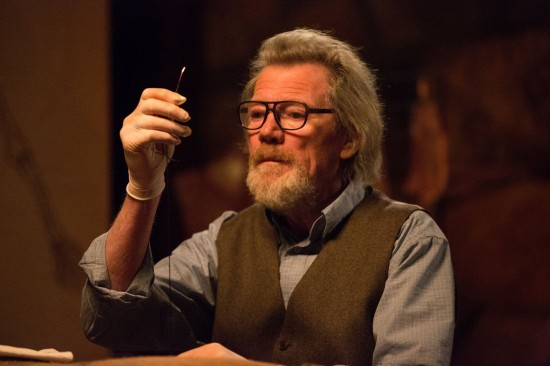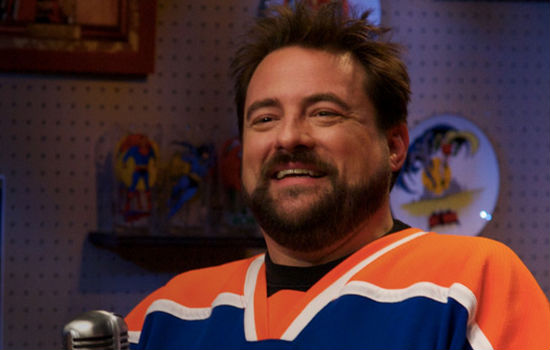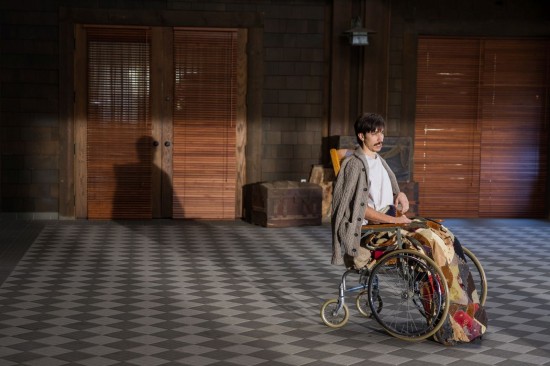Kevin Smith Interview Part 1: How The Making Of 'Tusk' Was Inspirational
Sit back, grab a drink, and settle in. Kevin Smith is about to speak.
Last week, we chatted with Smith on the occasion of the blu-ray release of Tusk. (The disc is available now.) The controversial film had its share of fans and detractors; I fell somewhere in the middle. I admired Tusk's ambition and the new direction for Smith, but at the same time acknowledged and was unforgiving of the film's flaws. In our interview, we asked Smith about some of those issues, spoke about what he feels he learned as a filmmaker from the experience, and a few of the more polarizing choices in the movie. Two or three questions took a planned 15 minute interview to 25 minutes, but if you're a fan of Kevin Smith, the director has rarely been so insightful about his craft.
However, because Smith talked for so long, we've decided to break this interview into a few parts. We already posted about his upcoming movies and projects. Now, Smith talks about how the making of Tusk not only reinvigorated him, but could be seen as an act of inspiration for fellow filmmakers. And from there, he went off on some fascinating tangents about camera movement, aspect ratios and a ton more. Below, read Part 1 of our Kevin Smith interview on Tusk.
Kevin Smith: Hey Germain, long time no see, how are you, sir?/Film: I'm good, thank you. I've been a fan for years; one of the things you always joke about is being a great writer but not a great filmmaker. With Tusk it feels like you grew as a filmmaker. From a filmmaking perspective, what was the most important lesson you think you learned?
Expediency rules the day. A lot of people will say like no, but this is the most valuable lesson of Tusk to me: If you dream it, do it, and do it fast. 'Cause if you don't, it's gonna slip away. You know, I get some ideas over the course of my career where I was like "Ooh, we should do this." Don't follow through, it never happens and then you wind up seeing somebody do something similar and be like "Why didn't I do that when I had the chance?" Now there was never a chance anybody ever was gonna make a similar movie to Tusk. It wasn't like competing asteroid movies or something like that. But at the same time when we did the podcast and you could hear me work myself up into the idea, like there was this kind of "Do you finish or do you not finish" moment? And there were a bunch of people like listening to the podcast who post on Twitter and Facebook like "Is that how you get started? Like you guys sat around and talked about other movies, made some jokes and then suddenly you said you had your own script. Like is that allowed? You said the whole third act would be like the third act in Iron Man. Is that okay to steal things like that?"
And so you realize some people think there's a rulebook or a certain procedure that has to be followed in order to do these things. So for me, I was like, well "What if I could just show them how easy it can be?" And naturally some people were like "It's easy for you 'cause you've made movies before." But as we all know, a couple years ago I was like "Fuck you, so long and thanks for all the fish." So people weren't really all that interested in working with me, making movies, particularly this fucking movie. So for me, it was about "Do it, make sure it happens." And so six months from the day we recorded the podcast, we were on a set and I was saying "Action."
And the reason that movie looks so good is because it was an incredibly collaborative experience. When you're going as fast as you're going, you don't really get to sit there and plan things out meticulously, because what you try and do is get the movie made period, dude. Like I know we tend to talk about movies when they're made. But getting a movie made these days, that's the biggest uphill struggle, man I've seen. In 20 years, the big difference is the coffers have gotten tighter. And not for me, 'cause I haven't tried to do this in a few years.

And when I went out to do Tusk, since the budget was low, it was kind of easy. It was $ 2.7 million. So I was gonna finance it myself, but Demarest came in and said, "We'll do it". But there are some cats out there can't make their miracle happen, man. Like we all saw an article last week talking about the disappearance of the mid range budget film. And there are filmmakers a lot better than me who make far more interesting films than me: John Waters, David Lynch, who aren't making films right now 'cause they can't pull loot together. You know, and some of them because like their budgets are higher and they don't know if they can work lower, whatever. But that's scary to me. I remember I did a thing at Lincoln Center, we had a screening of Valley Girl and then I spoke to Deborah Foreman was there, Freddie Elmes and the director, please help me, I'm a little stoned, but it's escaping me.
[Looks it up] Martha Coolidge.
Thank you. You know, she's a wonderful woman. She directed Real Genius, one of my favorite films of my teenage years. Such a great movie. So she was talking about how it's impossible for her to practice her art. She's like "People don't hire me." And like why? You're a great director and you've delivered your whole career. And she's like "People just age out of this business, Kevin." And so that was a scary thought to me. Like at one point I walked away from this business by choice. But to have that taken away from you, when the thing you love most in this life and the thing that you've been doing for a living is suddenly closed to you at least as a profession, as a way to earn a living and stuff? I'm sure she could always make a short film for nothing if she wanted to, just like any of us could. But to hear that that happens. There are people who are far better filmmakers than me who one day either price out of the game or people are just not that interested anymore. And that was kind of terrifying.
 Kevin Smith (continued): So for me, I said "If I could get this up and running and show people like 'Hey, man, it's, this is how you take a dopey idea that you sat around with your friends and made up'" and then take it all the way to execution. They all know the story of Clerks, but they don't really know the beginning story. They weren't there for me going, "Hey, I've got an idea for this movie and blah, blah, blah." They were there for the beginning of Tusk, the very moment when, I was sitting there going with Scott going "Oh, wouldn't this be weird if this was a movie?" So they heard the moment of inspiration and I was like if "We could take it all the way through production, release," like show them that you sit around with your friend, he's talking about something stupid and you shape it, treat it seriously and shoot it like it's as earnest as Argo. Even though it's a dopey movie about a guy turned into a walrus, you come up with something special.
Kevin Smith (continued): So for me, I said "If I could get this up and running and show people like 'Hey, man, it's, this is how you take a dopey idea that you sat around with your friends and made up'" and then take it all the way to execution. They all know the story of Clerks, but they don't really know the beginning story. They weren't there for me going, "Hey, I've got an idea for this movie and blah, blah, blah." They were there for the beginning of Tusk, the very moment when, I was sitting there going with Scott going "Oh, wouldn't this be weird if this was a movie?" So they heard the moment of inspiration and I was like if "We could take it all the way through production, release," like show them that you sit around with your friend, he's talking about something stupid and you shape it, treat it seriously and shoot it like it's as earnest as Argo. Even though it's a dopey movie about a guy turned into a walrus, you come up with something special.
I never really went to film school. I dropped out pretty quickly and stuff. I only did four or five months at the Vancouver Film School. So as a young filmmaker back in the day, I never had an experimental period. Clerks was my experimental film and started my career. So I never got to do the movies that I loved to watch growing up. Like Clerks wasn't the type of movie I grew up watching. That's the only movie I could make. But the movies I grew up watching, man, were like From Beyond, Re-Animator, rubber movies. When I was a kid, when I was about 13 we started getting cable in our neck of the woods. And suddenly you were seeing all these movies that you didn't even have access to because the video store didn't exist yet at this point. So in the early '80s, man, I was - it sounds weird to say it – but I was a rubber freak, man. Like I loved prosthetics, I loved effects. Before I ever wanted to be a filmmaker, I wanted to be a makeup artist. Had myself some nose putty, had a kit full of fake blood I made of karo syrup and was always doing half knives in people. Be like "Don't this look real?" So that world, that's like I desperately wanted Grand Illusion, the book that, the makeup book that was by what's his name? You know, the makeup horror...
[Looks it up] Tom Savini.
Yeah, the dude who was in Zack and Miri Make a Porno. In any event, that book, Grand Illusion, I wanted it so badly when I was a kid because it was a book that would show you exactly how Tom Savini did all those effects. So I could never find it. We had no Internet. They didn't carry that book at the library. And there ends my special effects makeup career. Because of access to information. We live in the information age where I could put up a podcast and people could hear an idea for a movie being born. And then I could kind of take them through production all the way through the rest of social media with the "Walrus Yes" hashtag. So at that point you're collaborative. And you're going so fast that you can't be like "No, this has to be exactly the way I see it." You have to be willing to compromise. And one of the compromises we made on this film is what made all the difference.
I always saw it as a 1:85 movie in my head, right? Not wide. This is a dopey little exploitation movie. But James Laxton was the D.P. that we hired. And we only hired James like because Dave Klein, my D.P. from Red State and Clerks and all those movies, he was off shooting Homeland. So we were going fast and I was like "I gotta get a new D.P." I looked at a movie that James had done and he had one shot in a music video that was underwater. And I was like "Oh we have to shoot underwater in this movie. Let me bring him on as the D.P." So the other thing that was in his favor is he shot a movie called For a Good Time, Call... and I was in it and I vaguely remember him on set. I was like "Hey, man, can you put one of those thin lenses on the camera?" And he was like "Oh it's already there." And so you remember somebody who's kind of funny. So I said, "Let's hire this guy."

So me and James are sitting around talking before the movie starts and he goes, "How do you wanna shoot?" So I'm thinking 1:85. He goes yeah? I was thinking 2:33. I was like "Really?" He's like "I don't know." He's going "It's a haunted house movie, it feels like we could kind of go in that direction." And I was like "All right.. And suddenly it went from this handheld Punk Rock movie that I had in my head to this kind of more lyrical thriller. I don't even know what you call it. I mean some people are like "It ain't a horror movie." I'm like "You're right, it ain't a horror movie. I don't know what the fuck it is." Actually I'd call it a 4:30 movie 'cause that's what I used to watch when I was a kid. And they ran this thing called the 4:30 movie where they'd have Godzilla week or monster gone awry week or Apes week for all the Planet of the Apes movies. So this movie reminds me very much of that kind of movie. But the look of it was kind of established by James going "Let's shoot 2:33" and me going "Yeah, all right." 'Cause suddenly I was like "Well I guess we won't do this handheld."
The other thing that really kind of defined our look was Philip was our dolly grip. The dolly grip, just in case, is the guy that pushes the dolly around so you get some nice, smooth shots on rails and whatnot. Camera movement. Sometimes, if it's up in somebody's face, that could be a Steadicam. But back in the day, it was all rails and stuff. So Philip was so good, butter smooth at the job, that suddenly we eliminated all of our Steadicam work, because he could kind of do it. Even if we set a weird track, he was able to keep it so smooth. You know how good you gotta be at that job in order for the Director to be like "That guy's a magician?" 'Cause of that, we changed how we were gonna shoot the movie again and suddenly we were shooting 2:33 and everything was on rails, slowly moving shots as people speak and whatnot.
And it's not that different from what I used to do, except I just actually move the camera now. I used to just set the camera up and let shit happen. Same thing, but now the camera's on rails, so there's this kind of tense movement. And it's one of those things too that like, I've been doing this 20 years, I should learn how to do it better. Malcolm Gladwell says 10 thousand hours of practice make you kind of good at something. And I've been doing this for a while. So suddenly my age has caught up with my ability to visually tell a story. Which is thrilling for a guy who for years, they're like "You can't shoot for shit." It's nice to be able to shoot for shit. Now they've changed it from you can't shoot for shit to your movies are fucking weird and stupid.
